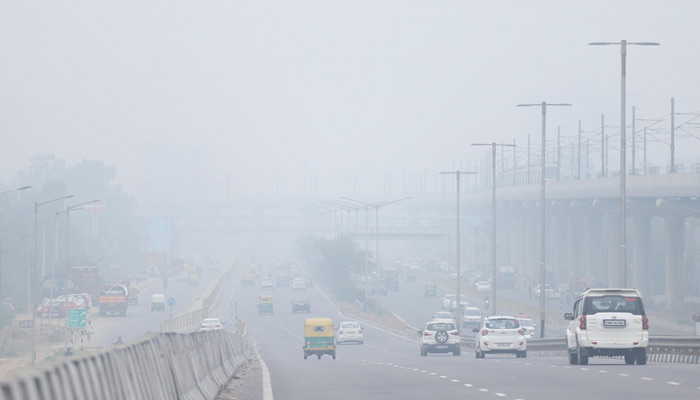India was the world’s eighth most polluted country in 2022, dropping from fifth place the previous year.
While the PM 2.5 level has dipped to 53.3 micrograms/cubic metre, that is still over 10 times the World Health Organisation’s safe limit.
The ranking was decided by Swiss firm IQAir in its ‘World Air Quality Report’ released on Tuesday. It is based on the level of PM 2.5, a pollutant closely tracked by scientists and health experts.
The data from 131 countries is taken from over 30,000 ground-based monitors, either government or non-government operated.

How India Dominates The Top 100
Indian cities dominate the top of the list which includes over 7,300 cities, the most the rankings have ever covered since 2017 when it covered less than 2,200.
The report puts the economic cost of air pollution in India at $150 billion, with the transportation sector causing 20-35 per cent of the PM 2.5 pollution. Other sources of pollution are industrial units, coal-fired power plants and biomass burning.
Lahore in Pakistan and Hotan in China are the top two most-polluted cities after which ranks Rajasthan’s Bhiwadi and Delhi in fourth place. At 92.6 micrograms, Delhi’s PM 2.5 level is almost 20 times the safe limit.
Consider the dubious domination: There are six Indian cities in the top 10, 14 in the top 20 (see table at the end), 39 in the top 50, and a staggering 65 in the top 100 up from 61 in the previous year. Delhi and New Delhi are both in the top 10, based on a new classification.
Delhi, Technically, No Longer The Most Polluted Capital
Delhi has so far been the most polluted capital in the world but this year the report has made a distinction between ‘greater’ Delhi and New Delhi the capital. Both are in the top 10 but New Delhi is ranked 2nd and the infamous distinction of being the world’s most polluted capital goes to Chad’s N’Djamena.
The difference in pollution levels is a miniscule 0.6 micrograms of PM 2.5. Also worth noting is that N’Djamena’s population is less than a million while New Delhi’s population is over four million.
But there may be a silver lining: Delhi’s next-door towns of Gurugram, Noida, Ghaziabad and Faridabad have seen a decline in pollution levels – from 34 per cent in Gurugram to 21 per cent in Faridabad, compared to the average PM 2.5 levels reported in previous years. Delhi has dipped barely 8 per cent.
But the actual levels of pollution in these cities are far higher than the Indian average. While Ghaziabad’s PM 2.5 average for 2022 is over 88 micrograms, Gurugram’s is 70.
At such chronically high levels of pollution, those most at risk include children as their lungs are still developing, the elderly, and the unwell, especially those with asthma, cancer and diabetes among other diseases.
As health risks remain high, the decline cannot be seen as an improvement – the air remains hazardous. This entire belt – a mega city – has a population of millions, with estimates varying from 38-42 million.
Agra Springs A Surprise
Interestingly, as many as 31 cities have seen a double-digit percentage decline in pollution levels. Of these, 10 are in Uttar Pradesh and seven in Haryana. The biggest fall has been in the Taj Mahal city, Agra, by 55 per cent. The average PM 2.5 between 2017-21 was 85 micrograms and in 2022 this was just 38 micrograms per cubic metre.
On the flip side, as many as 38 cities and towns have seen a rise in pollution compared to an average of previous years.
Six Metros Ranked
Among the other metros, Kolkata is the most polluted after Delhi, but by a wide margin. Chennai is relatively the cleanest with pollution ‘just’ 5x the WHO’s safe level. In fact, the only metros where pollution levels saw an uptick over the average since 2017 are Hyderabad and Bengaluru.

South Asian Problem – And Solution?
72 of the top hundred cities are in South Asia. Even though almost all these cities are in India, Pakistan and Bangladesh rank higher in the list of the ten most polluted countries. But air pollution is a common problem with these countries sharing ‘air sheds’, i.e.. pollutants from one area moving to another.
Calling South Asia the epicenter of air pollution, the World Bank analysed the costs of cutting pollution if the countries (including Nepal) did everything technically feasible to do so. If they worked separately, it would cost a prohibitive $2.6 billion dollars to cut 1 microgram/cubic metre of PM 2.5. However, if there were “full coordination” this cost would crash to $278 million per 1 microgram.
Currently, the human cost of PM 2.5 is over two million premature deaths in the region.

